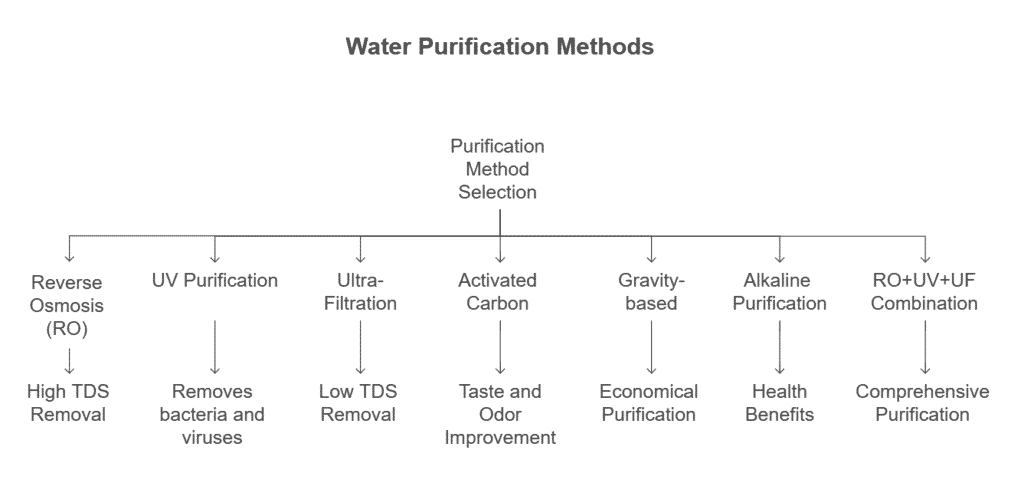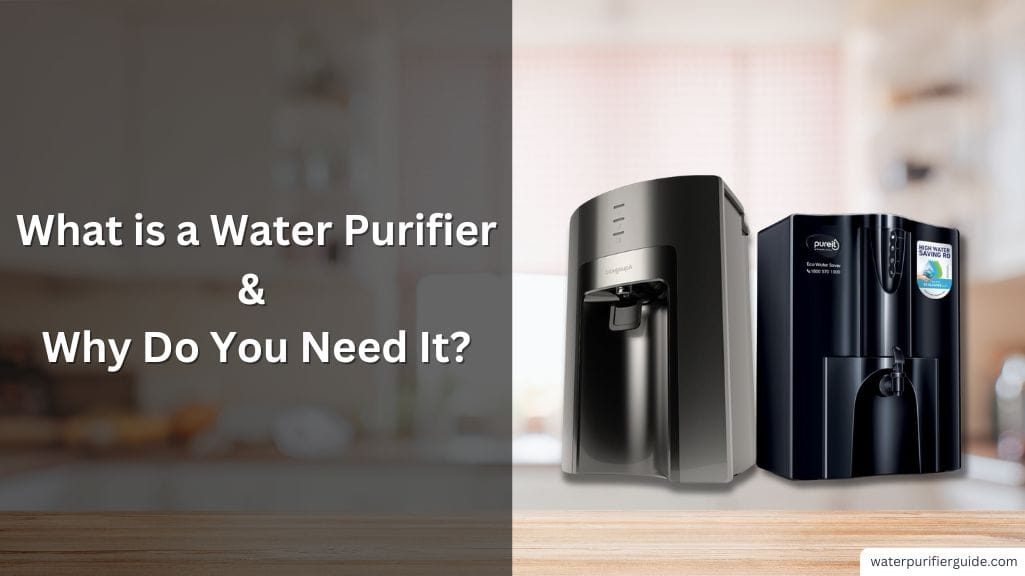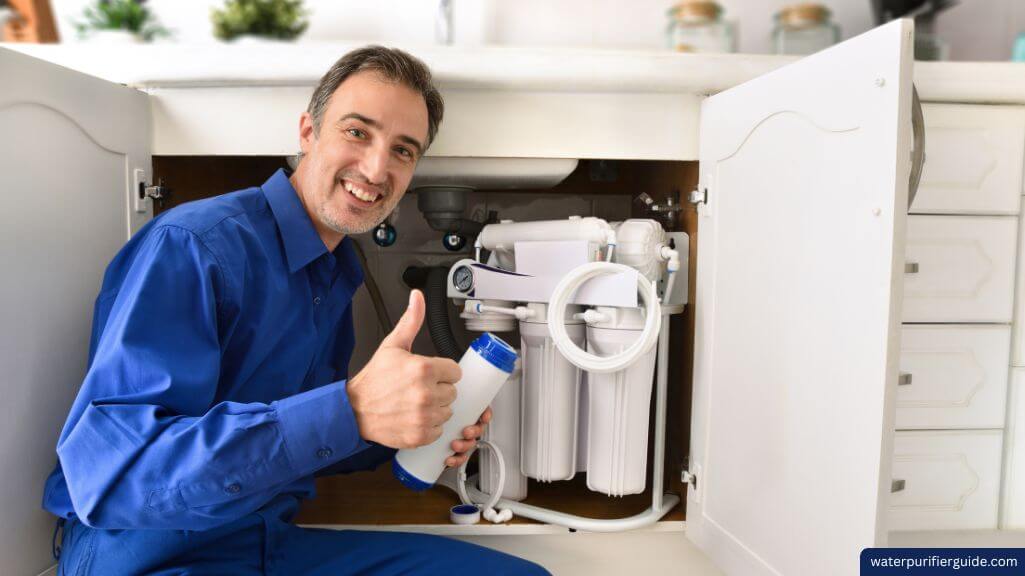Did you know that more than 70% of the water in India is not potable? Water pollution causes many diseases, such as typhoid, diarrhoea, and digestive problems. This is why it is important to have a good water purifier in every home.
Pure water is important not only for your health but also for the safety of your family. But there are many types of water purifiers available in the market—RO, UV, UF, gravity-based, and others. Each technology has its own importance and use.
In this article, you will learn about the different types of water purifiers in detail. This will help you choose the right purifier for your home or office.
Different Types of Water Purifiers and How They Work
There are many types of water purifiers available in the market, and each one has a different technology. To choose the right purifier, it is important to know how different water purifiers work and suitable for which type of water.
Let us understand the different water purifiers and their functioning in detail.

1. Reverse Osmosis (RO) Purifier
How does it work?
RO purifier has a semi-permeable membrane, which works to remove dissolved solids (TDS), heavy metals, bacteria and other impurities in the water. When water passes through the membrane under high pressure, only pure water comes out, and harmful elements are collected in a separate chamber. In this process, contaminants and other harmful particles are also removed, making the water drinkable.
Suitable for?
- Water with high TDS
- Borewell or hard water
Advantages and Disadvantages
✅ Advantages: Removes harmful metals and dissolved salts.
❌ Disadvantages: Some wastage of water.
2. Ultraviolet (UV) Purifier
How does it work?
UV purifiers use ultraviolet (UV) light, which destroys the DNA of bacteria, viruses and other microorganisms present in the water. The water passes through a special UV chamber, where this light kills the microorganisms present in the water, but does not affect the other physical and chemical composition of the water.
Suitable for?
- Municipal water with microbial contamination
Advantages and Disadvantages
✅ Advantages: Kills bacteria and viruses instantly.
❌ Cons: Does not remove dissolved solids (TDS) or heavy metals.
3. Ultra Filtration (UF) Purifier
How does it work?
UF purifiers have an ultra-fine membrane, which stops bacteria, viruses and larger particles. It is larger than the RO membrane, so it does not remove dissolved solids (TDS) in the water, but effectively filters out germs and dirt.
Who is it suitable for?
- Water with low TDS, without heavy metals.
Advantages and Disadvantages
✅ Advantages: Does not waste water and works well if the water is not very dirty.
❌ Cons: Does not remove dissolved salts.
4. Activated Carbon Purifier
How does it work?
This purifier uses Activated Carbon Filter, which has small pores. These pores absorb chlorine, pesticides, organic compounds and odorous elements present in the water. When water passes through this filter, harmful chemicals and odours are eliminated, making the water clean and taste better.
Who is it suitable for?
- If there is chemical contamination in municipal water.
Advantages and Disadvantages
✅ Advantages: Improves the smell and taste of water.
❌ Disadvantages: Does not remove heavy metals or bacteria.
5. Gravity-based Water Purifier
How does it work?
This purifier works on the principle of gravity without electricity. It uses a Ceramic and Activated Carbon Filter, which purifies water by filtering out dust, germs and some harmful chemicals from it. Water is poured into the upper chamber, and slowly gets filtered and collected in the lower chamber, making it drinkable.
Suitable for?
- Municipal water with low TDS.
Advantages and Disadvantages
✅ Advantages: Economical, easy to maintain and works without electricity.
❌ Disadvantages: Not effective for water with high TDS.
6. Alkaline Water Purifier
How does it work?
An alkaline water purifier works by increasing the pH level of water. It has Mineral Enhancement technology, which adds calcium, magnesium and other essential minerals to the water. This not only makes the water healthier, but also makes it more delicious to drink. The main purpose of this purifier is to reduce acidity in the body and strengthen the immune system.
Suitable for?
- To improve the taste of water and for health benefits.
Advantages and Disadvantages
✅ Advantages: Makes water more alkaline, which is good for the body.
❌ Cons: Expensive compared to other water purifiers.
7. RO+UV+UF Combination Purifier
How does it work?
This purifier is a combination of three different technologies – RO, UV and UF.
- The RO membrane removes dissolved solids (TDS), heavy metals and other harmful elements from the water.
- The UV light kills bacteria and viruses.
- The UF membrane filters out bacteria, dirt and other microscopic particles.
This means that this purifier removes all kinds of contaminants and provides completely safe and pure water.
Suitable for?
- For any type of water, especially when the water source is unknown.
Pros and Cons
✅ Pros: Ability to remove every type of contaminant.
❌ Cons: Expensive and requires regular maintenance.
Note: Every water purifier has its own features and limitations. To choose the right purifier, it is important to understand the quality of your water. If the TDS in water is high, then the RO purifier will be better. If only bacteria removal is needed, then a UV purifier will be perfect. Similarly, other technologies also have their own importance. So, choose the right water purifier as per your needs.
Comparison Table: Which Water Purifier is Best for You?
The table below compares different types of water purifiers to help you make the right choice.
| Water Purifier Type | Contaminants Removed | Suitable for What Water? | Cost (Initial + Maintenance) | Features |
|---|---|---|---|---|
| RO (Reverse Osmosis) | TDS, Heavy Metals, Bacteria, Viruses, Chemicals | High TDS (Borewell/Hard Water) | High Cost + Regular Filter Replacement | Highest Purification But Water Waste |
| UV (Ultraviolet) | Bacteria, Viruses | Low TDS Water (Municipal Corporation Water) | Medium Cost + Annual Maintenance | Kills Microorganisms But Does Not Remove Dissolved Solids |
| UF (Ultra Filtration) | Bacteria, dirt, viruses | Low TDS and lake/pond water | Low cost + minimal maintenance | Works without electricity but does not remove dissolved solids |
| Activated Carbon | Chlorine, pesticides, organic chemicals | Low TDS and municipal water | Low cost + low maintenance | Improves odor and taste of water, but does not remove microorganisms |
| Gravity-Based | Bacteria, dirt, some chemicals | Low TDS water | Very low cost + easy maintenance | Works without electricity but not capable of removing high TDS |
| Alkaline | No removal, just adds minerals | To improve taste and pH of clean water | High cost + minimal maintenance | Adds minerals beneficial for the body |
| RO+UV+UF (Combination Purifier) | All types of contaminants (TDS, bacteria, viruses, chemicals, dirt) | Suitable for any type of water | Very high cost + regular maintenance | Best purification but expensive and consumes more electricity |
Things to Keep in Mind:
- If your water has high TDS (like borewell water), then RO Purifier is the best option.
- If the only problem in the water is bacteria and viruses, then UV or UF Purifier will suffice.
- If you need a cheap and power-free option, then a Gravity-Based or Activated Carbon purifier is the right choice.
- If you want complete protection from all types of impurities, then RO+UV+UF combination purifier is the best.
Why Do You Need a Water Purifier?
Did you know that your drinking water may contain several invisible hazardous elements? Unpurified water may contain bacteria, viruses, heavy metals, dissolved salts and harmful chemicals. All these elements can pose a serious threat to your health.
Common Contaminants in Water
- Bacteria and viruses – These can cause diarrhoea, typhoid and other waterborne diseases.
- Heavy metals – Elements like arsenic, lead and mercury can act as poison in the body.
- Dissolved salts – High levels of TDS can have a bad effect on the kidneys and heart.
- Chemicals and pesticides – Chlorine and other chemicals found in water sources can cause serious diseases like cancer.
Health Risks of Unclean Water
If you drink unfiltered water, you may develop stomach infections, skin diseases, bone weakness and immune system problems. Drinking impure water for a long time also increases the risk of serious diseases.
How to Choose the Right Water Purifier
The quality of water varies in every region, so it is important to choose the right purifier.
- If the water contains more bacteria and viruses, then a UV purifier will be perfect.
- If the water contains more dissolved salts and heavy metals, then an RO purifier is necessary.
- If the water is slightly polluted, then a UF or gravity-based purifier can be a good option.
Frequently Asked Questions (FAQs)
1. Which water purifier is best for Borewell Water?
Answer: Borewell water is usually rich in high TDS (Total Dissolved Solids) and heavy metals. For such water, RO (Reverse Osmosis) purifier is the best option. It effectively removes dissolved solids, heavy metals (arsenic, lead, mercury) and other impurities.
2. Can I use a UV water purifier for high TDS water?
Answer: No, UV water purifier only kills bacteria and viruses, but it does not remove dissolved solids (TDS), heavy metals and chemicals. If the TDS of your water is high (above 500 ppm), it is better to use RO+UV purifier, as it removes dissolved solids along with microorganisms.
3. How often should I change my Water Purifier Filter?
Answer: The time of changing the filter depends upon water quality and usage.
Generally:
- RO Filter: Should be changed every 12 months.
- UV Lamp: Should be changed every 12-18 months.
- UF and Activated Carbon Filter: Should be changed every 8-12 months.
- Gravity-Based Filter: Should be changed every 8-10 months.
If the water is more polluted, the filter may get damaged quickly and may have to be replaced prematurely.
4. Can gravity-based purifiers protect against Bacteria?
Answer: Yes, Gravity-Based purifiers are capable of removing bacteria and impurities, but they do not provide 100% protection. They have Activated Carbon and UF (Ultra Filtration) technology that can remove larger particles and some bacteria. However, it does not remove harsh chemicals and dissolved solids (TDS). If your water has high levels of bacteria and viruses, a UV or RO+UV purifier is a better choice.
5. Does RO remove Minerals from Water?
Answer: Yes, RO purifiers can also remove essential minerals (such as calcium and magnesium) from water. But modern RO purifiers have a TDS controller or mineral cartridge that adds back essential minerals to the water. This makes RO water safe and nutritious.
6. Is Alkaline Water Best for Health?
Answer: An alkaline water purifier makes water alkaline by increasing its pH level and adds essential minerals to it. This water is considered beneficial for the digestive system, immune system and bones. If you want mineral-rich water to stay healthy, then an alkaline purifier can be a good option.
7. Why is RO+UV+UF purifier considered the best?
Answer: RO+UV+UF purifier is capable of removing all types of impurities, so it is considered the best option.
It includes:
- RO: Removes dissolved solids (TDS), heavy metals and harmful chemicals.
- UV: Eliminates bacteria and viruses.
- UF: Filters out dirt, bacteria and small particles.
If you want complete protection and don’t know the quality of water, then this purifier is the best.
Conclusion
So far, you have learned about the different types of water purifiers and how they work. Each purifier has its own specialty, depending on the contaminants present in your water.
If your water has high TDS, heavy metals and chemicals, then an RO water purifier is the best choice. If you just want to protect against bacteria and viruses, then a UV purifier is the right choice. Gravity-based and UF purifiers are good for water with low TDS, while RO+UV+UF purifier is the best option to remove all kinds of impurities.
Drinking pure water is important for your health. Choosing the right water purifier can help you avoid diseases and keep your family safe. Check your water quality first and invest in the right purifier accordingly. Drinking pure water is the most important step to a healthy life!
📌 Sources & References
The information in this article is based on publicly available data from trusted government bodies, health organizations, and water research institutions to ensure accuracy and relevance for Indian households.
- Reverse Osmosis (RO) Purifier – Reverse Osmosis (Wikipedia)
[Explains the reverse osmosis process used in RO purifiers for drinking water — how a semi-permeable membrane removes dissolved solids, salts, and many contaminants to produce potable water.] - Ultraviolet (UV) Purifier – Portable Water Purification (Wikipedia)
[Describes ultraviolet (UV) disinfection as a portable water purification technique, detailing how UV-C light inactivates microorganisms — directly relevant to UV water purifiers.] - Ultra Filtration (UF) Purifier – Ultrafiltration (Wikipedia)
[Provides an authoritative overview of ultrafiltration technology, including the use of semi-permeable membranes to remove suspended solids, bacteria, and other contaminants — core to UF purifiers.] - Activated Carbon Purifier – Water Dispenser (Wikipedia)
[Explains activated carbon filtration — a method widely used in water purifiers to adsorb organic chemicals, chlorine, taste, and odour issues.] - Gravity-based Water Purifier – Portable Water Purification (Wikipedia)
[Describes basic water purification techniques including gravity-based UV treatment and other simple methods suitable for low-resource settings — foundational for gravity water purifiers.] - RO+UV+UF Combination Purifier – WHO International Scheme to Evaluate Household Water Treatment Technologies
[WHO’s evaluation framework for household water treatment technologies shows how multiple methods (e.g., membrane filtration plus disinfection) are assessed for microbial performance, supporting explanation of multi-technology combination purifiers.]




